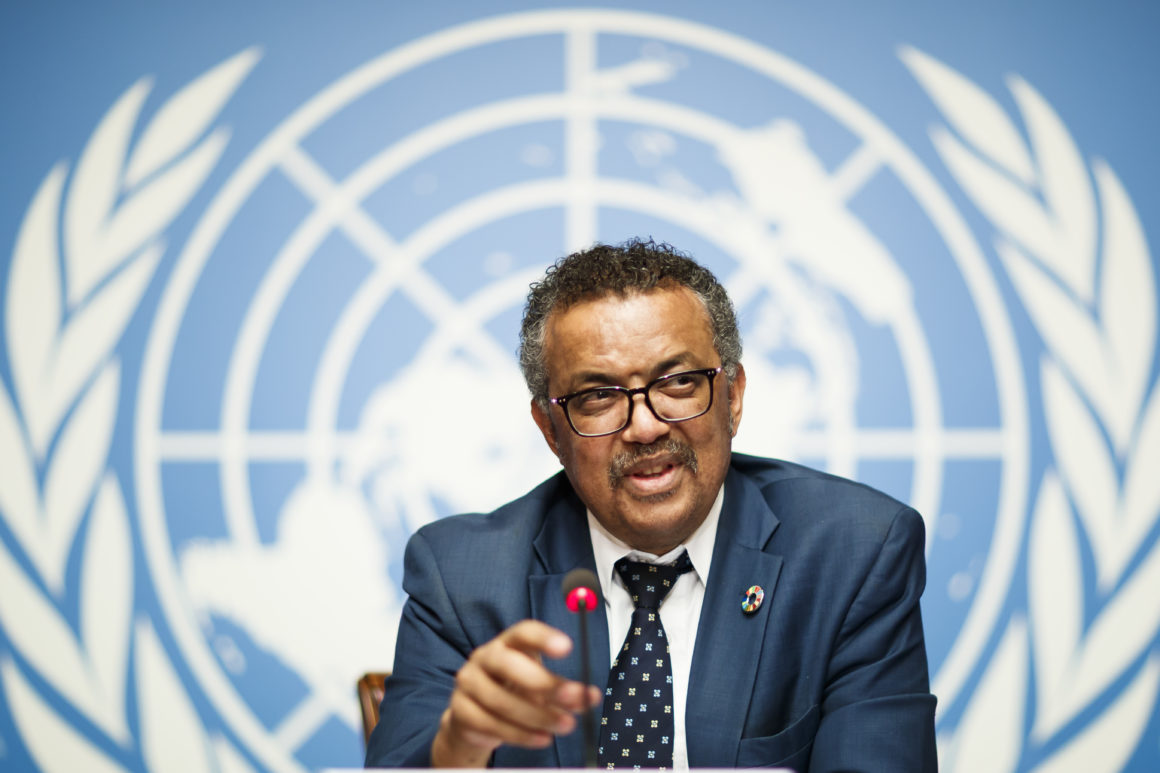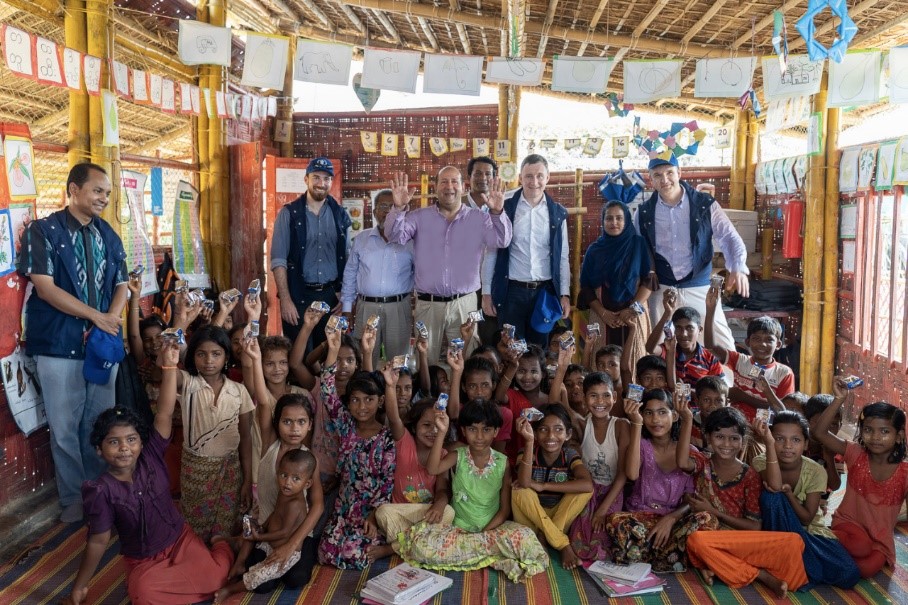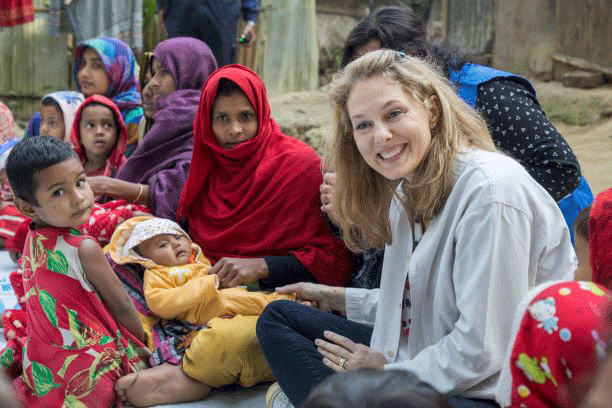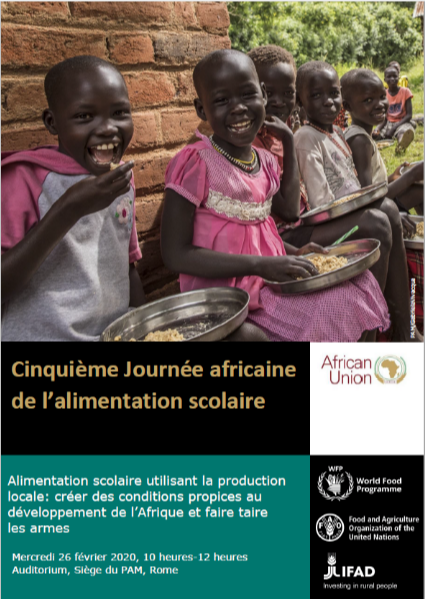POSTPONED to 16-17 April
---------------------------------------------------------------------------------------------------------------------------------------------------------------------------------------------------------------------------------------------------------------------
The 2020 First regular session of the Executive Board will be a short one, taking place from 24 to 25 February, covering important matters such as the Integrated Road Map revised delegations of authority.
Here are some of the highlights to expect from this year’s session:
Election of new Bureau
As per Rule IV of the WFP Rules and Regulations, the Board will, at its first session of each year, elect its new President and Vice-President, as well as other members of the Executive Board Bureau for 2020 - collectively designated as the Bureau. The current presidency and membership of the Executive Board Bureau can be viewed here.
The elected Bureau will follow:
| President | Vice-President | Member |
| H.E. Dr.Ulrich Seidenberger | Mr. Luís Fernando de Carvalho | H.E. Bothata Tsikoane |
| (Gernany, List D) | (Brazil, List C) | (Lesotho, List A) |
| Member | Member | |
| Dr. Bommakanti Rajender | H.E. Artur Andrzej Pollok | |
| (India, List B) | (Poland, List E) |
The Alternates are:
- List A - H.E. Seydou Cissé (Côte d'Ivoire)
- List B - Ms. KANG Hyo Joo (Republic of Korea)
- List C - Ms. Rebeca Cutié Cancino *(Cuba) *
- List D - Her Excellency Marie-Therese Sarch (United Kingdom)
- List E - H.E. Zoltán Kálmán (Hungary)
Among the primary functions, the Bureau facilitates the effective and efficient functioning of the Board and, in particular: (i) the strategic planning of the work of the Board; (ii) the preparation and organization of Board meetings; and (iii) the promotion of dialogue.
Special Guest
On the morning of Tuesday, 25 February, the Director-General of the World Health Organization (WHO), Dr. Tedros Adhanom Ghebreyesus, will provide brief remarks via a live video-feed from Geneva He will highlight WHO and WFP's collaboration for increased operational engagement towards improving health/outbreak-related responses.

Policy issues
1. Update on the Integrated Road Map: proposed delegations of authority and other governance arrangements
In this document, WFP management will request the Board’s approval for proposed delegations of authority from the Board to the Executive Director and proposed amendments to the WFP General Rules to facilitate the implementation of the implementation of multi-country strategic plans.
Draft decision
Having considered the update on the Integrated Road Map set out in document WFP/EB.1/2020/4-A/1/Rev.1 and recalling the Policy on Country Strategic Plans (WFP/EB.2/2016/4-C/1/Rev.1), the Financial Framework Review (WFP/EB.2/2016/5-B/1/Rev.1) and various other updates on the Integrated Road Map (WFP/EB.A/2017/5-A/1, WFP/EB.2/2017/4-A/1/Rev.1, WFP/EB.A/2018/5-D/1, WFP/EB.2/2018/5-A/1 and WFP/EB.2/2019/4-D/1), the Board:
i) recalls paragraph vi of its decision 2017/EB.2/2, whereby pursuant to WFP General Regulations Article VI.2(c), it approved interim delegations of authority to the Executive Director from 1 January 2018 to 29 February 2020 and decided that delegations of authority would be presented for its approval, following a review of the interim delegations of authority, at its 2020 first regular session;
ii) notes that a review of the interim delegations of authority was undertaken and presented for its consideration at its 2019 second regular session through the update on the Integrated Road Map set out in document WFP/EB.2/2019/4-D/1;
iii) approves the proposals set forth in paragraphs 36–51 of document WFP/EB.1/2020/4-A/1/Rev.1, relating to the delegations of authority to the Executive Director and the approval by correspondence procedure, to be used when appropriate, for revisions to country strategic plans and interim country strategic plans that necessitate Executive Board approval, and, accordingly, approves the delegations of authority set forth in annex III to document WFP/EB.1/2020/4-A/1/Rev.1, to become effective on 1 March 2020, and decides that it may further revise those delegations of authority following a review of them at its 2025 first regular session, without prejudice to the authority of the WFP Executive Board to conduct such a review at any time;
iv) recalls the multi-country strategic plans concept described in the update on the Integrated Road Map as set out in previous updates on the Integrated Road Map (WFP/EB.2/2018/5-A/1 and WFP/EB.2/2019/4-D/1); and
v) approves the multi-country strategic plans concept set forth in paragraphs 73–77 of document WFP/EB.1/2020/4-A/1/Rev.1 and further approves the accompanying rule changes set forth in annex IV of document WFP/EB.1/2020/4-A/1/Rev.1.
If approved, the proposed delegations of authority and other governance arrangements would ensure increased flexibility that would allow WFP to align with the requirements of the new United Nations sustainable development cooperation frameworks; reducing the administrative burden on country offices.
Click here to view the document.
2. Update on WFP’s implementation of United Nations General Assembly resolution 72/279
In September 2019, the United Nations Secretary-General launched the Decade of Action to move forward toward achieving the objectives of Agenda 2030.
In this informative item, Board members will receive an update on WFP’s efforts on the implementation of United Nations General Assembly resolution 72/279 on repositioning the United Nations development system to deliver by 2030.
Click here to view the document. This update will be followed by an oral update on the United Nations Sustainable Development Cooperation Framework (UNSDCF) guidance and common country analysis.
Evaluation reports
The findings and recommendations from two evaluation reports and their respective management responses will be presented for consideration:
- Summary report on the strategic evaluation of WFP’s capacity to respond to emergencies (2011–2018), covering the full range of emergencies WFP responds to.
- Summary report on the evaluation of the WFP People Strategy (2014–2017), covering the outcomes of the strategy, which reflects human resource management at the time of its development.
Other business
1. Concrete steps towards implementation of the recommendations of the joint Board/management working group on harassment, sexual harassment, abuse of power and discrimination
Following the Willis Towers Watson external review and JWG report issued at EB.2/2019, WFP management will present the steps taken towards the preparation of a comprehensive action plan for WFP to strengthen its efforts to address harassment, sexual harassment, abuse of power and discrimination (HSHAPD) in the workplace; along with an outline of the plan featuring six core areas of action: (i) Reaffirming values; (ii) Leadership; (iii) Employee engagement; (iv) Policy and system revisions; (v) Discipline; (vi) Communications.
Click here to view the document. The Co-chairs of the Joint Executive Board/Management Working Group (JWG) on HSHAPD will also present a report as the JWG’s mandate will be ending in this session.
2. Report on the field visit of the WFP Executive Board to Bangladesh
In October 2019, the Executive Board Bureau undertook its annual field visit to Bangladesh to see WFP’s work, particularly in Cox’s Bazar – which is home to some 1.2 million displaced Rohingya.
Presently, WFP is providing food and nutrition assistance to over 880,000 in Cox’s Bazar and implementing a range of livelihood programmes that include host communities; and adopting innovative approaches to enhancing resilience and response to climate-related stresses and natural disasters.
Click here to view the report submitted to the Board for information.

3. Update on preparations for the 2021 United Nations Summit on Food Systems
The 2021 United Nations Summit on Food Systems will be a key event for the transformation of food systems which are central to the achievement of the 2030 Agenda. An update on the planning for the Summit and WFP’s participation will be given.
Side events and exhibitions
Monday, 24 February
- Unleashing the Power of Innovative Financing for the First 1,000 Days.
Co-sponsored by the WFP Nutrition Division (OSN) and the Islamic Development Bank (IsDB). Among new ways of financing for development, this innovative financing model seeks to involve both public and private sectors in a global initiative to support coordinated nutrition action with one key objective: to frontload public investment for high-quality, multi-sectoral outcome delivery at scale. In addition to WFP and the IsDB representatives, a statement from HRH Princess Sarah Zeid on the journey that IsDB and WFP have been on towards launching a Sukuk will be delivered. (13:15-13:45, Auditorium)

Tuesday, 25 February
- Partnering in Impact Evaluation, Achieving Zero Hunger. Launching WFP’s Impact Evaluation Strategy.
Sponsored by the WFP Office of Evaluation (OEV), this side event will present the formal launch of WFP’s Impact Evaluation Strategy (2019-2026), establishing a framework to increase the coverage and use of rigorous impact assessments in humanitarian and transitional contexts. The side event will bring together representatives from WFP, the Government of Germany and the World Bank. (8:15-9:45, Aula I, Aula Delegatis)
- Anticipating Disasters: Forecast-based Financing (FbF).
Sponsored by WFP Programme – Humanitarian and Development Division (PRO), this side event showcases the role of anticipatory action within humanitarian and government disaster response systems based on weather and seasonal forecasts. This side event will be presented by WFP, with representatives of Germany, Norway and Denmark. (13:15-14:45, Aula I, Aula Delegatis)
- Informal Launch of new WFP School Feeding Strategy 2020-2030: A chance for every schoolchild - Partnering to scale up School Health and Nutrition for Human Capital (Upon close of EB session, Auditorium)
Exhibitions throughout the week
- Food Assistance for Assets Through the Eyes of the Asset Impact Monitoring System (AIMS).
Promoted by PRO, AIMS shows how satellite imagery can be a cost-effective way of monitoring the long-term positive changes to landscapes after Food Assistance for Assets (FFA) interventions. (Venue: Orange Corner)
- Emergency Field Operations Pocketbook App Launch.
Staffed by WFP’s Emergencies Division, the exhibition is an occasion to relaunch the pocketbook project, which was first launched by WFP in print in 2002. Nearly two decades later, the pocketbook is an app, an aide-memoire for WFP emergency operators, providing all the information they need for operating in emergency situations. (Venue: Red Tower Exhibition Area)
To mark the closing of the 2020 first regular session of the Executive Board, an event dedicated to the Fifth Africa Day of School Feeding will take place on Wednesday 26, from 10:00 to 12:00 in the Auditorium.
Follow the 2020 first regular session of the Executive Board via webcast.

